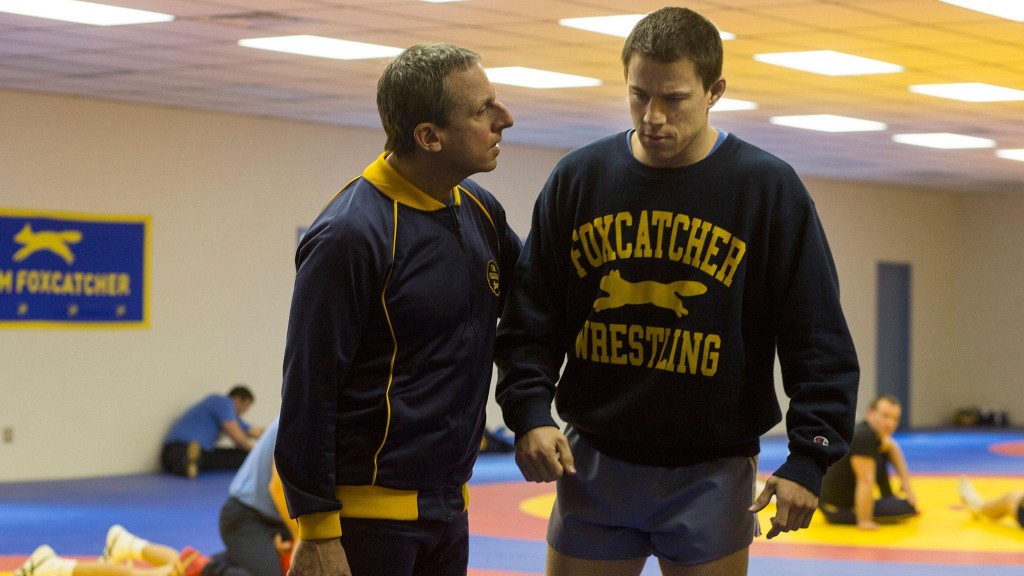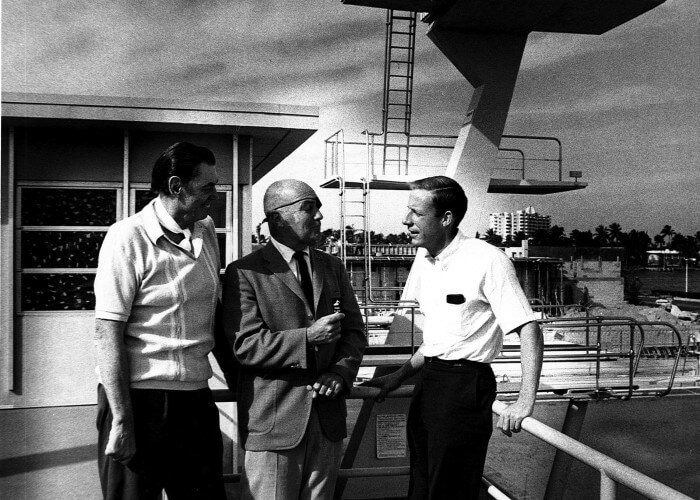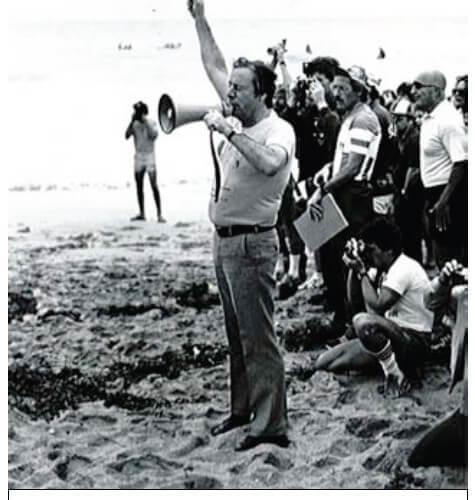Swimming Left On Cutting Floor For Oscar-Nominated “Foxcatcher” Movie

Commentary by Jeff Commings
TUCSON – Most scripts that are nominated for the Best Original Screenplay at the Academy Awards each year are largely about people and situations that are entirely fictional. A few others come from real-life events, qualifying for this category because the writers don’t have previously published work on which to base their screenplays.
The latter instance is the case for the film “Foxcatcher,” but it could be argued that most of the film was created entirely in the screenwriters’ minds. Though based on people and events that actually happened in the late 1980s, Oscar-nominated screenwriters E. Max Frye and Dan Futterman took so many liberties with the chronology and omitted other crucial elements that it was very difficult for me to appreciate the film. The most glaring fallacy in the film comes in the disregard for the major role elite swimming played during the events that transpired on screen.
“Foxcatcher” portrays the growing bond between the mysterious billionaire John Du Pont and wrestling champion Mark Schultz, as the connection between Mark and his older brother, Dave, weakens. Du Pont takes Mark Schultz under his wing, fully financing his training for the 1988 Olympics. The film fully ignores the equal involvement Du Pont had in the successful Foxcatcher swim team at the time, also fully funding that program which saw Dave Wharton’s and Trina Radke’s selection to the Olympic swimming team. The screenwriters went so far out of their way to eliminate swimming from the story that they claimed Du Pont was at the USA wrestling trials, when he was actually at the Olympic swimming trials.
I wasn’t aware of Du Pont’s involvement with elite swimming until about an hour before I saw the film. I happened to come across a piece by Bruce Wigo, the executive director of the International Swimming Hall of Fame, before heading to the movie theater, and perhaps it was no coincidence that the subject of Wigo’s article was John Du Pont. I was moved by the comments many coaches made about Du Pont in the article. Richard Shoulberg, the head coach of Foxcatcher at the time, was quoted as saying “I loved the man!” John Leonard, the executive director of the American Swim Coaches Association, said Du Pont was “a national treasure.” Those weren’t the words I expected to read, based on the character I had seen in the two-minute trailer for the film.
Wigo’s article didn’t shy from discussing Du Pont’s mental state, but always stayed true to the fact that he was always supportive of the sport, even donating to various swimming causes. Knowing this information before watching the film did change my perspective. I kept hoping that, at the very least, the film would mention Foxcatcher swimming, to further show Du Pont’s generosity and willingness to help athletes achieve their dreams. Nothing. I hoped that after Mark Schultz made the 1988 Olympic team that I would also hear a passing reference to the two Foxcatcher swimmers also going to Seoul. Not a peep.
And that switcheroo in the movie that put Du Pont at the Olympic Trials for wrestling instead of swimming? The film takes it a step further, saying that Du Pont left the wrestling meet when his mother died. But Shoulberg talks vividly in the Wigo article about being told personally by Du Pont about his mother’s passing at the Olympic swimming trials.
I’m fully behind the other nominations the film received, especially for Steve Carell’s performance as Du Pont. It’s a departure for Carell, and he does very well with the material he’s given. If I were in the room on February 22 when the Original Screenplay nominees are read at the Academy Awards show, I wouldn’t clap for “Foxcatcher.” It strays so far from the truth that I wonder how much is really fact and how much is really fiction. Even Mark Schultz has publicly blasted the film for taking a detour from reality.
Every film based on actual events takes dramatic license in order to make the action interesting. I can’t accept that John Du Pont’s involvement with swimming was completely disregarded in “Foxcatcher” for what turned out to be just a run-of-the-mill wrestling movie.
“Foxcatcher” was also nominated for Oscars in Supporting Actor (Mark Ruffalo), Directing (Bennett Miller) and Makeup. The film is currently playing in theaters nationwide in the United States.






What is the deal with trying to rebrand this guy as a hero to the swimming world? Did he use his money to the benefit of many athletes? Sure… but so freaking what?
He KILLED a guy. From a PR perspective we as a swimming community should be glad they didn’t connect him to swimming. To use the words that the coaches did in the Wigo article you refer to such as “hero”, “patriot” and “legend” is a ridiculous insult to true hero’s, patriots and legends.
He was wealthy and many coaches and athletes benefited from that wealth. It happened… we can’t deny that… but we CAN refrain from trying to rebrand a murderer as a hero.
It’s no wonder we’ve had pedophiles walking around our decks for decades. We clearly have a difficult time looking beyond results… which is pathetic and sad and embarrasing.
Well put. Of all the things to carp about in this movie, to criticize it for not placing enough importance on swimming seems to be missing the forest for the trees. Just because someone was involved with swimming doesn’t mean that it has to be mentioned if it’s not relevant – and in this case, it’s not.
There is no connection to swimming nor a complete movie about swimming because the American public does not want to see one. Obviously, you have a bias towards swimming but you must understand the majority of the public just will never have an interest in competitive swimming to the degree of a blockbuster film. Just given the nature of the sport, I highly doubt that is ever going to change and articles ‘calling out’ films for understanding the American demographic better than you certainly aren’t going to change that fact.
Have you ever heard of the phrase- Never let the truth get in the way of a good story? To add swimming to the mix would be distracting – this is ultimately a film about men, pride and dreams, told well and with stripped back dialogue and scenes you can see the growing resentments and tension between the characters. I whole heartedly agree with them omitting a whole other sport and cast of characters from the film, it adds nothing. Anyone who is into film can see that- I gues it depends whether you’re more into swimming than you are film
The movies are a source of disinformation unless they are clearly marked documentaries and even there, truth can be manipulated. To think otherwise is naive. They should be viewed only as entertainment.